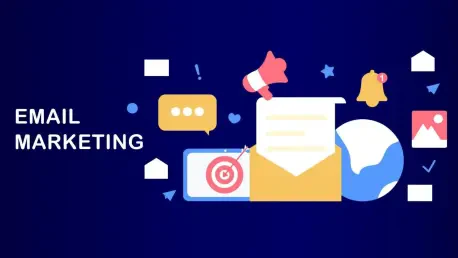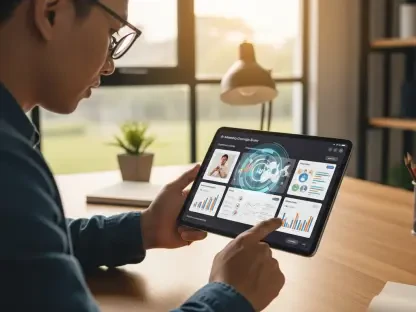In the landscape of digital marketing, email remains a crucial touchpoint between businesses and their audiences, as its functionality and strategies are on the cusp of a significant transformation in the present year, evidenced by the expansion of its role beyond traditional confines. Propelled by cutting-edge technologies and evolving consumer expectations, this evolution is set to redefine engagement strategies. Companies are now tasked with the challenge of navigating an ecosystem where innovation doesn’t just drive communication but also deepens customer loyalty. As the sector undergoes this metamorphosis, understanding the implications of these advancements will be key to maintaining a competitive edge in an increasingly dynamic market.
Automation and Personalization: The New Norm
Email marketing has transcended its initial simplistic operations thanks to burgeoning capabilities of automation. Modern platforms now incorporate sophisticated workflows that allow businesses to automate outreach in ways previously deemed unattainable. This revolution is spearheaded by the ability to deliver data-driven personalization, which is no longer merely an enhancement but a necessity. Advanced automation tools enable marketers to analyze customer behavior and predict preferences accurately. This empowers them to craft and deliver messages precisely when recipients are most receptive, thus capturing relevant interactions. Ultimately, automation and personalization work synergistically, improving efficiency while ensuring each communication is both timely and meaningful.
Equipped with dynamic segmentation capabilities, email marketing platforms help brands tailor their messages to distinct audience subsets. This customization is achieved by sorting clients based on criteria like demographic data, purchasing history, and engagement patterns. As a result, businesses can connect more profoundly with their audiences by crafting content that resonates on a personal level. The ability to evoke a sense of individualized attention strengthens customer relationships, paving the way for increased loyalty and retention. As personalization becomes a cornerstone strategy, automation ensures that these interactions occur seamlessly, thereby enhancing the overall effectiveness of marketing campaigns and boosting business growth.
Advanced Analytics and AI: Driving Strategy
Emerging technologies are revolutionizing how businesses strategize, with data analytics standing at the forefront of this shift. By this point, companies have come to rely heavily on insights provided by data analytics to shape and measure campaigns. These metrics offer a valuable glimpse into customer behavior, preferences, and responsiveness, thus informing strategic refinements. With the incorporation of AI-driven analytics, marketing teams can unlock even deeper insights, effortlessly predicting trends and patterns that guide actions toward optimized outcomes. The actionable data derived from these tools ensures that every decision made in a campaign is supported by precise information, ultimately enhancing its success.
AI integration introduces a new level of sophistication to email marketing. Beyond basic data analysis, AI tools analyze extensive datasets to produce recommendations on optimal content, send times, and audience segmentation. These capabilities ensure maximum engagement by predicting the likelihood of successful interactions. The efficacy of predictive analytics underscores the importance of AI in crafting strategies that are both informed and intuitive. By refining targeting methods, AI not only increases the accuracy of personalization efforts but also aligns messaging with audience expectations, resulting in improved engagement rates and ensuring that marketing initiatives resonate effectively with intended recipients.
Seamless Integration and Mobile Optimization
A cohesive digital presence is a fundamental expectation for modern businesses, and email marketing platforms must meet this demand through seamless integration. The interconnectedness of CRM systems, social media platforms, and e-commerce channels is integral to building a holistic marketing strategy. Integrated platforms foster consistent messaging across all customer touchpoints, streamlining the dissemination of information and ensuring a unified customer experience. This seamless integration enables marketing efforts to be part of a broader dialogue that spans multiple platforms, enhancing both reach and engagement by maintaining coherence in messaging across diverse channels.
As consumer behavior shifts toward mobile usage, the necessity for mobile-optimized content becomes apparent. Initially, mobile devices were supplementary to desktop usage, but they have since evolved into the primary tool for accessing emails. In response, email marketing platforms have prioritized content that adapts seamlessly to smaller screens, recognizing that responsive design is now more important than ever. By providing templates and layouts that adjust fluidly across various devices, platforms address the growing trend of on-the-go engagement, ensuring that emails maintain their integrity and impact regardless of where they are viewed. This optimization not only enhances user experience but also mitigates the risk of messages being flagged as spam due to non-responsive design, ensuring successful delivery.
Privacy, Security, and Usability
In the rapidly changing world of digital marketing, email continues to be a vital connection between businesses and their audiences, while the strategies and capabilities of email marketing are on the verge of a major shift this year. It’s become clear that email’s role is growing beyond its conventional boundaries, influenced by new technologies and shifting consumer preferences. This evolution promises to change how companies connect with their customers. Enterprises face the challenge of navigating a landscape where innovation not only enhances communication but also strengthens customer loyalty. As this industry undergoes profound changes, comprehending the effects of these advancements is essential for those wishing to stay competitive in a market that’s becoming increasingly dynamic. The ability to leverage these technological shifts will be pivotal in maintaining relevance and gaining a competitive advantage. Understanding these dynamics will be crucial for businesses hoping to thrive in an exciting, tech-driven era.









